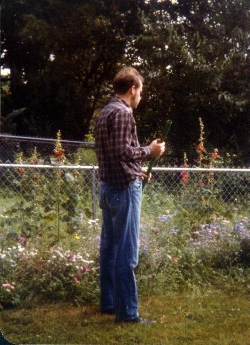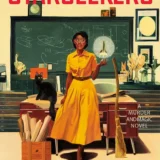This is supposed to be a positive thing, though it’s inspiration comes from a negative place.
As the puppy kerfuffle of 2015 progressed, I was increasingly struck by how distant and removed many of the puppies seemed to be from any kind of a real fannish background.
From a misunderstanding of the Hugo Awards (they’re “popular” awards), to denigration of “convention going fandom”, to claims of never having heard of the Hugo Awards, it became apparent, at least to me, that many of the individuals attacking Worldcon and the Hugo Awards (if not Fandom as a whole in effigy) had little or no understanding of Fandom.
That’s Fandom with a Big F, btw. The group of people around the world who, in one fashion or another, enjoy a connection to the history and traditions, the personalities and the quirks that are the legacy of the people who gathered together in New York, Philadelphia, Chicago and Leeds back in the mid-1930s and who, through their efforts, created a community that elevated the science fiction genre from pulp obscurity to harbinger of the future. A community that has continually advanced social ideas ahead of the mainstream, a community of dreamers who envisaged a future and has seen it come to be.
The concept that there is a difference between someone who “only reads” SF, or “only plays” SF games, or only attends gigantic media conventions that incorporate some SF elements and Big F fans has been a part of the Fan community from its very beginning. First Fandom fans recognized that there were substantial differences between themselves and “mundanes”; the created special names for fellow-travelers who were almost, but not quite FANS – filthy-pro, huckster, fakefan. Early New York fandom was beset with feuds between those who wanted to focus on science and those who wanted to focus on science fiction. The sciencefictioneers won.
Fans (big F) are the kind of people who bother to hunt up The Enchanted Duplicator, read it and get it. (Things have changed since it was written of course, but the central idea still holds sway: Trufans are special because they have made Fandom their focus – FIAWOL!)
Much of the definition of what a Trufan is these days is centered on conventions, largely because many of the other things that used to set them apart have gotten absorbed by the mainstream. It used to be that reading and corresponding (however infrequently) with other fans was enough. If you were capable of picking up a copy of Amazing Stories and weren’t put off by the BEMs and rocketships on the cover; if you were able to suspend your disbelief because you knew that the stories you read foretold a likely future, you were by default a fan.
No more. Things have become tremendously diluted by the mainstream’s embrace of virtually all things sfnal. It is now possible to watch SF on television virtually 24/7; see an SF-related film in the theatre almost every week of the year; play SF-themed games incessantly, read SF (often not labeled as such) without raising an eyebrow and attend events identified as conventions – all without being a FAN.
Yet the actual, hard line of demarcation remains elusive, at least partially owing to the fact that Fans are reluctant to exclude anyone (one of fandom’s better qualities) by creating exclusive definitions. Yet those of us who are FANS recognize each other (even when we disagree) and also recognize those who are not (all the while making no judgement on that difference, I hasten to add. Not being a Trufan is not a negative, it’s just a statement of fact – and a status that can change on a whim of the holder.)
In pursuit of getting a stronger handle on this circumstance, I posed a series of interview questions to members of the Fan History group on Facebook. I thought it would be a good place to start because that group is made up entirely of Trufans.
Today, I present the first in a series of responses to those questions and I should point out that, in typical Fannish fashion, the answers are anything but monolithic. Apparently Fans have as many different ideas about what it means to be a Fan as there are Fans, which just serves to point out how difficult it is to get a handle on this question.
Our first responder is John Thiel. First, the preamble to the questions that were asked:
The Voices of Fandom Interview Questions Ground rules: The questions are designed to evoke answers that will help those who are new to fandom or clueless about “real” fandom to gain greater insight and understanding of what, why and how one is a Trufan.
“Trufan”. “real” fan, FAN, etc., are used to describe those individuals who have made a community out of sharing their interest in Sfnal-related subjects over the years. They are the individuals who identify as carrying on the culture and traditions of those who founded Fandom beginning in the mid-1930s. If you have regularly attended conventions, worked on fanzines, collect, filk, costume, help run conventions – perform activities associated with fandom and are recognized by other fans as a FAN, then these words apply to you for purposes of this interview. Working definitions, if you will. Not because I say so, but because one of the problems we have in fandom are loose, ill-defined definitions (and we need to have a starting place for meaningful discussion).
Undefined definitions is itself a very fannish thing, because we are reluctant to create walls around things (and justifiably so). We are also very cognizant of the fact that definitions can be stifling and can have unintended consequences. But what I think we can all agree upon is that those of us who self-identify as Trufans (and are recognized to one degree or another as such by other Trufans) are members of a specific sub-culture that has traditions, morals, accepted modes of behavior and core interests/activities around which we gather from time to time.
The problems facing fandom are multi-fold, but key among them I believe are the following: our graying is not nearly as much of a problem as the fact that we are ineffective in passing our culture on. (Presuming we’d like to do so. I would.) our cultural sensibilities often act against us – we’re reluctant to spend money to “market” or proselytize (if you like fandom as it is, join us, if not….) (Note: this works well for establishing a community of dedicated individuals, but does not work so well in the “outreach” department) we tend to shy away from mundane politics (which is increasingly finding its way into the arguments of those who would change fandom, and by those who are responding) the generations from which new fans will be drawn largely do not share our out-cast, ghettoized origins.
SF (at least in film and on TV) and geeky stuff is cool, not something to hide (or get beat up over, something that many of us experienced to one degree or another) Fortunately, we have evidence that sub-cultures do manage to survive and thrive; if we can make it past the next 25 years as a community, I expect that Fandom will continue indefinitely into the future.
I would prefer all of your answers to come from a positive viewpoint; I’m not asking you to spin things, but I am pointing out the focus, which is: Fandom is a real culture; we care about these things; we’d like to pass them on in a meaningful manner; we think that most people are confused about what being a fan means; our definitions are what has worked for US for going on 85 years now; Fandom is not lockstep; there’s nothing wrong with not being our kind of fan; look what Fandom has done for the wider culture at large. That kind of thing.
I would also prefer that you each individually address the subjects and stay away from making personal comparisons (I’m a fan but so and so is not because….). This should be about your personal experiences and the positives you’ve gained from associating with Fandom, not about anyone or anything else.
And now, an introduction to John Thiel:
 Born in Gary, Indiana, attended grade school in Valparaiso up to fourth grade, then moved to Midlothian, Illinois, school up to seventh grade, moved to Markham, Illinois in the middle of seventh grade in a House On the Borderland kind of experience involving dispossession. Moved to Bloomington, Illinois in the middle of my sophomore year of high school, and did my Senior year of high school in Lafayette, adding Purdue University to that. Considered a scholar.
Born in Gary, Indiana, attended grade school in Valparaiso up to fourth grade, then moved to Midlothian, Illinois, school up to seventh grade, moved to Markham, Illinois in the middle of seventh grade in a House On the Borderland kind of experience involving dispossession. Moved to Bloomington, Illinois in the middle of my sophomore year of high school, and did my Senior year of high school in Lafayette, adding Purdue University to that. Considered a scholar.
First science fiction was GODS OF MARS. Joined the N3F and the Cult when a freshman in high school.
Editor of Caveat Emptor, The International Youngfan, Phantasm, Stellarzine (a correspondence substitute). My first Cult FR was GODDESS.
Left fandom and did some army time, then returned and rejoined the N3F and joined APA-H. Was the O-O of Apa-H for a time, and head of the Fan-Pro Coordinating Activity for the N3F.
Attended numerous conventions in Chicago, South Bend Indiana, Columbus, Ohio, Indianapolis and Detroit. My favorite was Starbase Indy.
Edited Ionisphere (for the title of which I used an obscure spelling indicating that it was a fanzine and not a scientific journal), APA-H and Pablo Lennis. Sorry I could not send everyone in fandom a copy of these zines. But a whole lot of fans got at least one copy. Also did Vor-Zap, the O-O of the Lafayette Interstellar Society.
Attended meetings in Lafayette also of the SS Voyager Society and the Society for Creative Anachronism.
And now, John’s answers:
1. How and where did you first become aware of Fandom?
AMAZING STORIES had a fanzine review column. Although my first purchase of SF magazines were GALAXY and ASTOUNDING, I was interested to see the fanzine reviews in AMAZING and bought a copy. My actual thought at the time was, “Hey, Wha–?”
2. How old were you at the time?
Eleven years old
3. How long had you been reading SF prior to learning about Fandom?
I read my first SF when I was eight, THE GODS OF MARS.
4. What about Fandom interested you enough to want to learn more/participate?
It looked like an opportunity to publish something, and I had access to a mimeograph.
5. Did you then (or now) view yourself as being on the outside of mainstream culture? If so, do you think this contributed to your involvement with Fandom?
Not me–I was going to school, and that’s pretty linked in with mainstream. Also, I have always dwelt in the mainstream
6. Before you actually encountered Fandom, what did you think it was? (What did you imagine Fandom to be, as opposed to what it really was?)
Amazing was pretty clear about what fandom was. I was the first fan to say “Goshwow” in a magazine letter column.
7. What are your primary involvements with Fandom? (con-running, filking, fanzine pubbing…)
Fanzine publishing and net activity.
8. What does being involved with Fandom do for you?
It provides continuity with the past.
9. Do you recognize Fandom as being, by definition, a sub-culture? (an ethnic, regional, economic, or social group exhibiting characteristic patterns of behavior sufficient to distinguish it from others within an embracing culture or society)
It is too ethereal and dispersed to be a culture.
10, What do you believe are the primary differences between Fannish culture and mundane culture? (You may list several if you are so inclined.)
Fan “culture” is existentially facetious and aloof, more apt to change and more creative.
11. What do you perceive as being Fannish values?
Continuation, interchange, thought.
12. Do you think that Fandom lives up to those values?
It’s in many ways incapacitated, for example, there are no reviews in the magazines.
13. In the broader sense of being a fan, anyone who reads, watches, listens to, games , model builds, etc., science fiction properties is a “fan”. Is there a difference between such individuals and those who identify as a FAN? If so, what is that difference?
Carrying on Fan Activity, as opposed to wearing creature costumes.
14. What, if any, differences do you perceive between Fans of your generation and F(f)ans of younger generations?
My generation was a younger generation once. Today’s fandom is more interested in the existence than in the substance of science fiction, and in the structure rather than the production of fandom.
15. If someone wanting to become a Fan approached you to ask how they should go about doing so, what would you say to them?
Contact people, read fanzines.
###
John THiel can be found on Facebook. His publication – Surprising Stories – can be found here.
Next week we’ll hear from another fan.
If you consider yourself to be a Trufan, feel free to provide your own answers to these questions and send them in with an image of yourself and a shot biography. You can email them here.
Steve Davidson is the publisher of Amazing Stories.
Steve has been a passionate fan of science fiction since the mid-60s, before he even knew what it was called.








